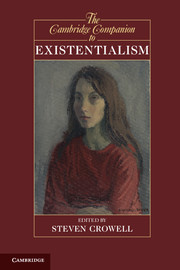Book contents
- Frontmatter
- I Introduction
- II Existentialism in Historical Perspective
- III Major Existentialist Philosophers
- 4 Kierkegaard’s single individual and the point of indirect communication
- 5 “What a monster then is man”: Pascal and Kierkegaard on being a contradictory self and what to do about it
- 6 Nietzsche: after the death of God
- 7 Nietzsche: selfhood, creativity, and philosophy
- 8 Heidegger: the existential analytic of Dasein
- 9 The antinomy of being: Heidegger’s critique of humanism
- 10 Sartre’s existentialism and the nature of consciousness
- 11 Political existentialism: the career of Sartre’s political thought
- 12 Simone de Beauvoir’s existentialism: freedom and ambiguity in the human world
- 13 Merleau-Ponty on body, flesh, and visibility
- IV The Reach of Existential Philosophy
- Bibliography
- Index
- OTHER VOLUMES IN THE SERIES OF CAMBRIDGE COMPANIONS
9 - The antinomy of being: Heidegger’s critique of humanism
from III - Major Existentialist Philosophers
Published online by Cambridge University Press: 28 March 2012
- Frontmatter
- I Introduction
- II Existentialism in Historical Perspective
- III Major Existentialist Philosophers
- 4 Kierkegaard’s single individual and the point of indirect communication
- 5 “What a monster then is man”: Pascal and Kierkegaard on being a contradictory self and what to do about it
- 6 Nietzsche: after the death of God
- 7 Nietzsche: selfhood, creativity, and philosophy
- 8 Heidegger: the existential analytic of Dasein
- 9 The antinomy of being: Heidegger’s critique of humanism
- 10 Sartre’s existentialism and the nature of consciousness
- 11 Political existentialism: the career of Sartre’s political thought
- 12 Simone de Beauvoir’s existentialism: freedom and ambiguity in the human world
- 13 Merleau-Ponty on body, flesh, and visibility
- IV The Reach of Existential Philosophy
- Bibliography
- Index
- OTHER VOLUMES IN THE SERIES OF CAMBRIDGE COMPANIONS
Summary
THREE QUESTIONS
Heidegger's “Letter on Humanism” was written in November 1946, first as a response to a letter by the French philosopher Jean Beaufret, who ever since late 1940 had worked tirelessly to introduce the French to Heidegger's thought. Already in the fall of 1945 Beaufret had Jean-Michel Palmier deliver to Heidegger a series of four articles he had written, “À propos de l'existentialisme,” accompanied by a letter. Heidegger appreciated the understanding of Being and Time they demonstrated. On September 12, 1946, Beaufret met Heidegger for the first time in his hut in Todtnauberg. Later, in November, he sent Heidegger another letter, asking him to clarify the relationship of his thought to Sartre's existentialism. In it he posed these questions: (1) “How can we restore meaning to the word ‘humanism’”? (GA9, p. 315/219); (2) How does ontology relate to ethics? (GA9, pp. 352–53/254–55); (3) “How can we preserve the element of adventure that all research contains without simply turning philosophy into an adventuress?” (GA9, p. 362/263). Heidegger's reply, dated November 23, was later reworked and published in 1947, together with “Plato's Doctrine of Truth,” significantly not in Germany, but in Switzerland, as part of a series edited by a former disciple, Ernesto Grassi. The shadow of his association with National Socialism lay heavy over Heidegger. This long, but quickly written essay is his first publication after the end of the Second World War.
- Type
- Chapter
- Information
- The Cambridge Companion to Existentialism , pp. 178 - 198Publisher: Cambridge University PressPrint publication year: 2012
- 3
- Cited by



